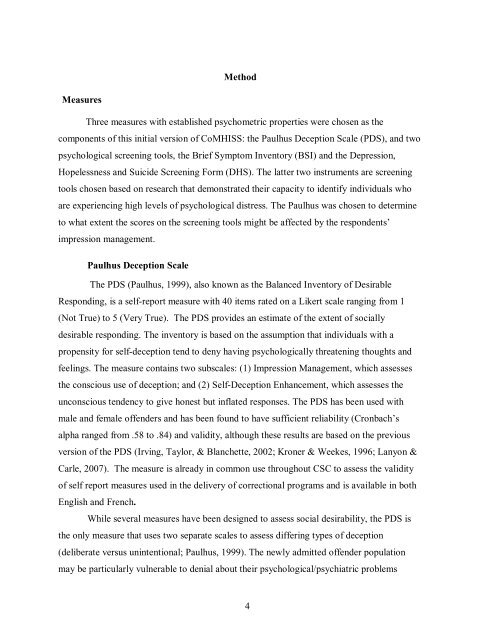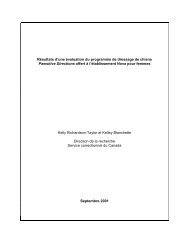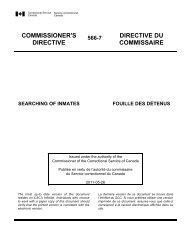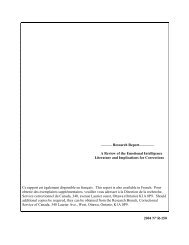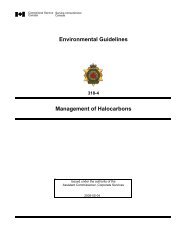The Brief Symptom Inventory (BSI) - Service correctionnel du Canada
The Brief Symptom Inventory (BSI) - Service correctionnel du Canada
The Brief Symptom Inventory (BSI) - Service correctionnel du Canada
You also want an ePaper? Increase the reach of your titles
YUMPU automatically turns print PDFs into web optimized ePapers that Google loves.
Measures<br />
Method<br />
Three measures with established psychometric properties were chosen as the<br />
components of this initial version of CoMHISS: the Paulhus Deception Scale (PDS), and two<br />
psychological screening tools, the <strong>Brief</strong> <strong>Symptom</strong> <strong>Inventory</strong> (<strong>BSI</strong>) and the Depression,<br />
Hopelessness and Suicide Screening Form (DHS). <strong>The</strong> latter two instruments are screening<br />
tools chosen based on research that demonstrated their capacity to identify indivi<strong>du</strong>als who<br />
are experiencing high levels of psychological distress. <strong>The</strong> Paulhus was chosen to determine<br />
to what extent the scores on the screening tools might be affected by the respondents’<br />
impression management.<br />
Paulhus Deception Scale<br />
<strong>The</strong> PDS (Paulhus, 1999), also known as the Balanced <strong>Inventory</strong> of Desirable<br />
Responding, is a self-report measure with 40 items rated on a Likert scale ranging from 1<br />
(Not True) to 5 (Very True). <strong>The</strong> PDS provides an estimate of the extent of socially<br />
desirable responding. <strong>The</strong> inventory is based on the assumption that indivi<strong>du</strong>als with a<br />
propensity for self-deception tend to deny having psychologically threatening thoughts and<br />
feelings. <strong>The</strong> measure contains two subscales: (1) Impression Management, which assesses<br />
the conscious use of deception; and (2) Self-Deception Enhancement, which assesses the<br />
unconscious tendency to give honest but inflated responses. <strong>The</strong> PDS has been used with<br />
male and female offenders and has been found to have sufficient reliability (Cronbach’s<br />
alpha ranged from .58 to .84) and validity, although these results are based on the previous<br />
version of the PDS (Irving, Taylor, & Blanchette, 2002; Kroner & Weekes, 1996; Lanyon &<br />
Carle, 2007). <strong>The</strong> measure is already in common use throughout CSC to assess the validity<br />
of self report measures used in the delivery of correctional programs and is available in both<br />
English and French.<br />
While several measures have been designed to assess social desirability, the PDS is<br />
the only measure that uses two separate scales to assess differing types of deception<br />
(deliberate versus unintentional; Paulhus, 1999). <strong>The</strong> newly admitted offender population<br />
may be particularly vulnerable to denial about their psychological/psychiatric problems<br />
4


